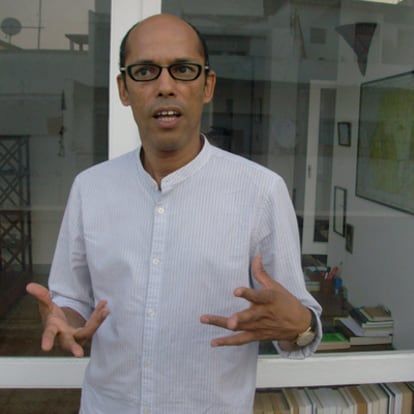"Western Sahara was the first of the Arab revolts"
IT worker Elabadila Chbihna Maaelaynine is a member of the pro-democracy protest movement in Morocco
On 4 November, 2010, Elabadila Chbihna Maaelaynine left his home in Casablanca to fly to Laâyoune, the capital of Western Sahara. Although he is well integrated into Moroccan society, with a well-paid job as a computer programmer, as a Sahrawi he says he felt he had to see the Agdaym Izik camp set up by some 12,000 refugees a month earlier in the outskirts of the city. Five days later, Moroccan police forcibly dismantled the camp, leaving at least 12 people dead, among them several police officers.
Just under three months later, on February 20, Maaelaynine was among the thousands attending a peaceful demonstration in the Moroccan capital of Rabat calling for constitutional and political reform in Morocco that would include a solution to the conflict in Western Sahara.
"Western Sahara was where the first Arab revolts took place, but unlike in Tunisia and Egypt, there has been no happy ending," says the 46-year-old, whose great-grandfather was Sheikh Maaelaynine, a local tribal leader who stood up to the French and Spanish colonizers a century ago, and who founded the former Spanish colony's religious capital Smara.
The Western Sahara conflict is both one of the world's oldest and one of its most neglected. More than 30 years after the war began, following Spain's hasty departure and Morocco's land grab, the displacement of large numbers of people and a ceasefire in 1991 that froze military positions, its end remains remote.
Maaelaynine has been campaigning discreetly for reform in Morocco for several years: in 2003, shortly before Rabat offered limited autonomy to Western Sahara, he published an article in the weekly Le Journal calling for greater political independence, along with a bigger share of the revenue from the region's vast mineral wealth. He is now one of the leaders of the February 20 movement, which continues to hold peaceful protests every Sunday in cities throughout Morocco. He blames the Moroccan authorities for the violence that ensued when the police raided the camp.
Mohammed Ghalous, the government representative for the Laâyoune region, said the gendarmerie and auxiliary forces had moved in "to end a situation which had exhausted all means of dialogue," by dismantling the camp.
The Polisario Front guerrilla movement, which seeks independence for the Western Sahara, accused the security forces of injuring hundreds of people in the dawn raid on the camp. The security forces raided the camp by ground and air, using helicopters.
Maaelaynine condemns the violence, and says that the organizers of the protest camp were extremely careful not to provoke the Moroccan authorities, and imposed careful checks on who entered the camp, banning Polisario flags, for example. He says that those responsible for the deaths of the Moroccan police officers should be brought to justice. "But I have no respect for a regime that cracked down in this way on people who were staging a peaceful protest," he adds.
The unrest in November came ahead of yet another failed round of talks between Morocco and the Polisario Front. The latter wants a UN-organized self-determination referendum, with independence as one of the options. Morocco has so far rejected any proposal that goes beyond greater autonomy.

Tu suscripción se está usando en otro dispositivo
¿Quieres añadir otro usuario a tu suscripción?
Si continúas leyendo en este dispositivo, no se podrá leer en el otro.
FlechaTu suscripción se está usando en otro dispositivo y solo puedes acceder a EL PAÍS desde un dispositivo a la vez.
Si quieres compartir tu cuenta, cambia tu suscripción a la modalidad Premium, así podrás añadir otro usuario. Cada uno accederá con su propia cuenta de email, lo que os permitirá personalizar vuestra experiencia en EL PAÍS.
¿Tienes una suscripción de empresa? Accede aquí para contratar más cuentas.
En el caso de no saber quién está usando tu cuenta, te recomendamos cambiar tu contraseña aquí.
Si decides continuar compartiendo tu cuenta, este mensaje se mostrará en tu dispositivo y en el de la otra persona que está usando tu cuenta de forma indefinida, afectando a tu experiencia de lectura. Puedes consultar aquí los términos y condiciones de la suscripción digital.








































